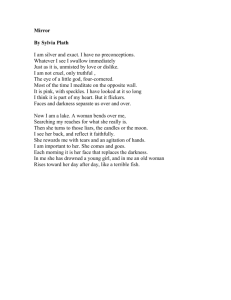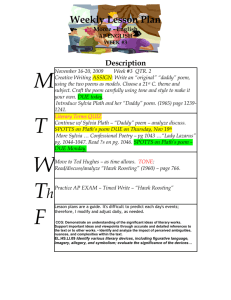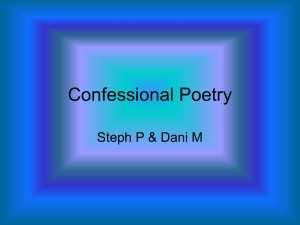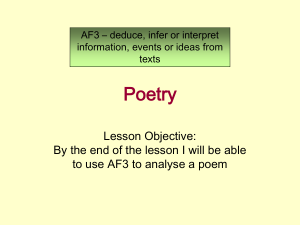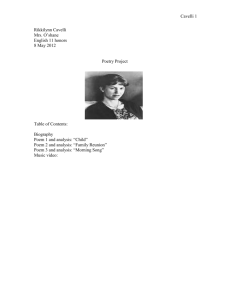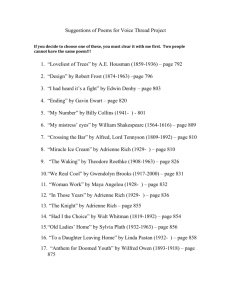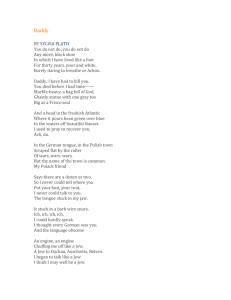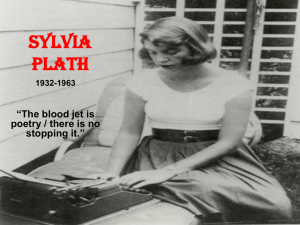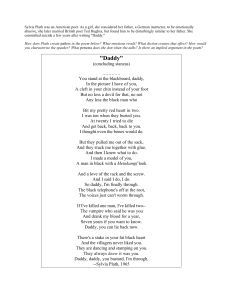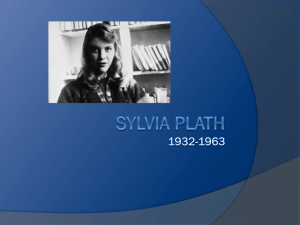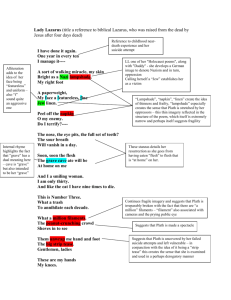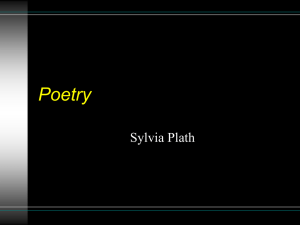Literary Analysis of Sylvia Plath's "Daddy"
advertisement
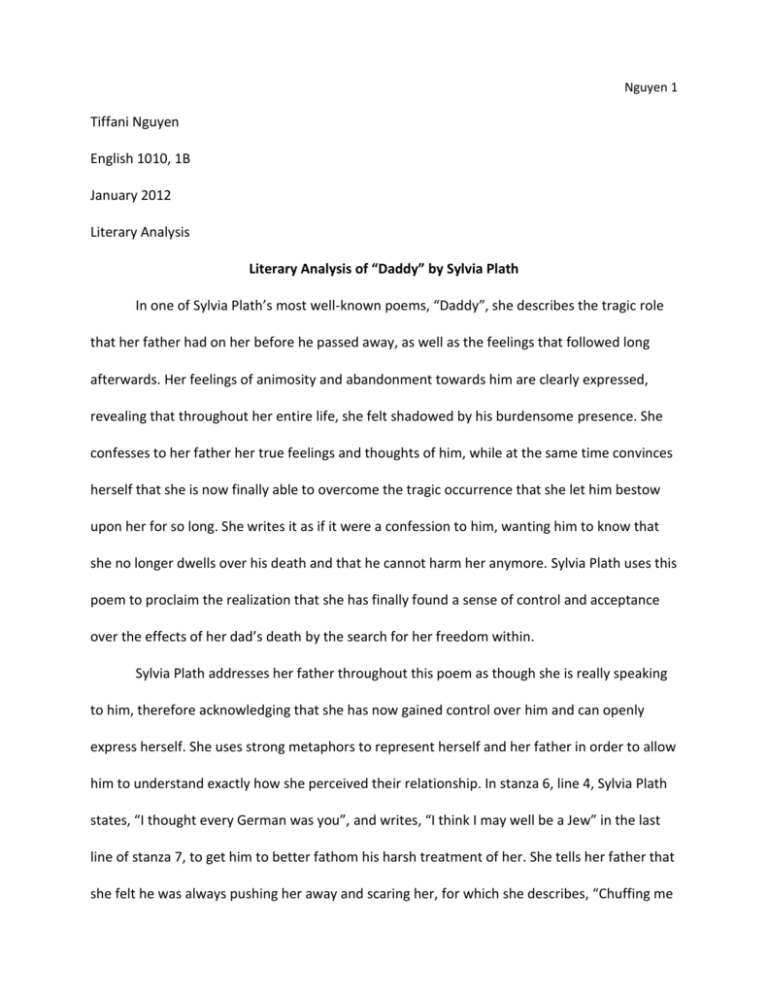
Nguyen 1 Tiffani Nguyen English 1010, 1B January 2012 Literary Analysis Literary Analysis of “Daddy” by Sylvia Plath In one of Sylvia Plath’s most well-known poems, “Daddy”, she describes the tragic role that her father had on her before he passed away, as well as the feelings that followed long afterwards. Her feelings of animosity and abandonment towards him are clearly expressed, revealing that throughout her entire life, she felt shadowed by his burdensome presence. She confesses to her father her true feelings and thoughts of him, while at the same time convinces herself that she is now finally able to overcome the tragic occurrence that she let him bestow upon her for so long. She writes it as if it were a confession to him, wanting him to know that she no longer dwells over his death and that he cannot harm her anymore. Sylvia Plath uses this poem to proclaim the realization that she has finally found a sense of control and acceptance over the effects of her dad’s death by the search for her freedom within. Sylvia Plath addresses her father throughout this poem as though she is really speaking to him, therefore acknowledging that she has now gained control over him and can openly express herself. She uses strong metaphors to represent herself and her father in order to allow him to understand exactly how she perceived their relationship. In stanza 6, line 4, Sylvia Plath states, “I thought every German was you”, and writes, “I think I may well be a Jew” in the last line of stanza 7, to get him to better fathom his harsh treatment of her. She tells her father that she felt he was always pushing her away and scaring her, for which she describes, “Chuffing me Nguyen 2 off like a Jew/ A Jew to Dachau, Auschwitz, Belsen” (7.2-3). Since this poem was written a while after World War II, it all but clarifies their relationship in a much clearer and easier manner for his understanding. She directly speaks to her father incorporating her personal opinion of Hitler and her father, stating, “With your Luftwaffe, your gobledygoo / And your neat mustache/ And your Aryan eye, bright blue / Panzer-man, panzer-man, O You—“(9.2-5). Her description proves to be very specific in the terms of getting her point across to her father, Luftwaffe referring to the German air force that she believed he had, the neat mustache and the Aryan eye describing the certain characteristics of Hitler that she saw similar to those of her father, and lastly calling him a panzer-man, being much like a feared tank machine and heartless. The fresh topic of war that she recently experienced shows him just exactly what he had done to her and put her through in a more relatable way. By directly speaking to him and being unafraid of addressing him about her feelings, Sylvia Plath discloses that she has gained control over her father, forcing him to listen to her words, and showing him that he can no longer continue to overshadow her. Throughout the poem, Sylvia Plath tells a story, about what she thought of her father from the beginning, what she comes to believe about him, and lastly how she overcame her father’s shadow. She first provides information about how it was to have been living with him enveloping her life for so long. In the very beginning of this poem, she recalls, “For thirty years, poor and white, / Barely daring to breathe or Achoo” (1.4-5). Having died around the age of thirty, it reveals that Plath had to endure these hardships for practically all of her life, noting that she was living in fear of his constant presence. She begins to form a definite opinion and perspective of him though, showing that the more time that she had to live with him agonizing her, her awareness became more real. By stating all her thoughts, she comes to the strong Nguyen 3 realization that she has accepted it, therefore finally appreciating herself and her courage to reveal to the man that has haunted her for so long. In the ending stanzas of this poem, she finally discloses to him her place in the situation now, exposing that she has been able to move forward from him and everything she had to endure because of him, by marrying a man similar to her own father. She personally felt that they both were so alike in the ways of torturing her, saying they sucked the life out of her with their evil black hearts. So by ridding herself of one of them, she too can easily conquer the uneasiness of both, “If I’ve killed one man, I’ve killed two—“(15.1). The message that she concludes with states, “Daddy, daddy, you bastard, I’m through”, clearly meaning that she has overcome the fear of her father and the despair living inside of her. Finally, Plath uses powerful metaphors and transitions from child to adult to better explain her relationship and feelings throughout her short life. She frequently switched back from a nursery rhyme structure to one that was more mature in explaining her life to fully show the length of time that this daunted on her. The most obvious representation of her childhood would be addressing her father as “Daddy”, though she wrote this poem at the age of 30. She reminisces in stanza 12, “I was ten when they buried you / At twenty I tried to die/ And get back, back, back to you”. She often includes words that remind the audience of her childhood to express the fact that he had left her at such a young age, and from then on she became haunted of thoughts of him. Plath then switches back to a more modern perspective to fully declare the pain that still dwells upon her by using forceful metaphors and comparisons on the visualization of her father. By writing in both perspectives, the point that she was affected her entire life, starting from the day of his death to the little time before her passing, we realize Nguyen 4 that she was unable to get over the feeling of abandonment by her father until shortly before death. In conclusion, Sylvia Plath wrote “Daddy” in order to speak her few last words for him to hear because her whole life she lived in despair and held these words in, too afraid to speak out. She has lastly gained confidence in herself through the course of the poem depicting the story of her life that was so strongly influenced by her dad, the courage she found to release all her thoughts directly to him, and the different perspectives in which she declared his effects.
